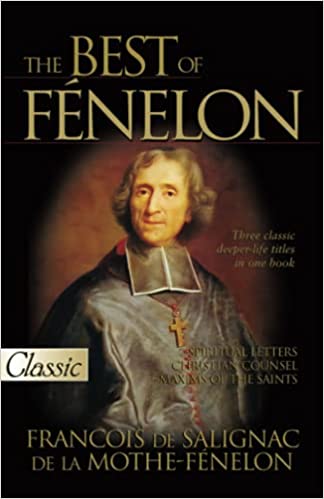The Present is the point at which Time touches Eternity. Of the present moment, and of it only, humans have an experience analogous to the experience which [God] has of reality as a whole; in it alone, freedom and actuality are offered them. He would therefore have them continually concerned either with Eternity (which means
being concerned with Him) or with the Present--either meditating on their eternal union with, or separation from, Himself; or else obeying the present voice of conscience, bearing the present cross, receiving the present grace, giving thanks for the present pleasure.
- C. S. Lewis (1898-1963), The Screwtape Letters
(Be here now in love this day.)
|
JER 14:17-22; PS 79:8, 9, 11 AND 13
MT 13:36-43
Jesus dismissed the crowds and went into the house.
His disciples approached him and said,
“Explain to us the parable of the weeds in the field.”
He said in reply, “He who sows good seed is the Son of Man,
the field is the world, the good seed the children of the Kingdom.
The weeds are the children of the Evil One,
and the enemy who sows them is the Devil.
The harvest is the end of the age, and the harvesters are angels.
Just as weeds are collected and burned up with fire,
so will it be at the end of the age.
The Son of Man will send his angels,
and they will collect out of his Kingdom
all who cause others to sin and all evildoers.
They will throw them into the fiery furnace,
where there will be wailing and grinding of teeth.
Then the righteous will shine like the sun
in the Kingdom of their Father.
Whoever has ears ought to hear.”
Reflection on the Scriptures
“Let them grow together until harvest” (Matthew 13: 30)
Parables are concrete. Sower, fields, wheat, weeds. These well-worn sights are not the stuff of dreams. But Jesus’ companions were unsure. Hemmed in by the crowd, they couldn’t hear past the chatter around them. Follow me, says Jesus, and he closed the door to escape the crowd. The disciples did not pretend to get it. Confused, they asked questions. Jesus listened and carefully
explained. Together, they reached the quiet place of understanding.
Some growers pounce on every weedy intruder. Their gardens sparkle. In God’s fields, weeds and wheat entangle. The rows are tousled as plants sway in the breeze. This garden is unkempt, like our lives. Time passes and we sort it. Grains ripen and bend toward the sun. Our merciful sower stretches out the growing season. Not until harvest does judgment unfold. . .
God, do not weigh our failings. For your name’s sake, send help quickly.
- by Jeanne Schuler
The Existence of God
by Francois Fenelon
SECTION XIX. Of Animals, Beasts, Fowl, Birds, Fishes, Reptiles, and Insects.
Amongst the animals, wild beasts, such as lions, have their biggest muscles about the shoulders, thighs, and legs; and therefore these animals are nimble, brisk, nervous, and ready to rush forward. Their jaw-bones are prodigiously large, in proportion to the rest of their bodies. They have teeth and claws, which serve them, as terrible weapons, to
tear in pieces and devour other animals. For the same reason, birds of prey, such as eagles, have a beak and pounces that pierce everything. The muscles of their pinions are extreme large and brawny, that their wings may have a stronger and more rapid motion: and so those creatures, though somewhat heavy, soar aloft and tower up easily to the very clouds, from whence they shoot, like a thunderbolt, on the quarry they have in view. Other animals have horns. The greatest
strength of some lies in their backs and necks; and others can only kick. Every species, however, has both offensive and defensive arms. Their hunting is a kind of war, which they wage one against another, for the necessities of life. They have also laws and a government among themselves. Some, like tortoises, carry the house wherein they were born; others build theirs, as birds do, on the highest branches of trees, to preserve their young from the insult of unwinged
creatures, and they even lay their nests in the thickest boughs to hide them from their enemies. Another, such as the beaver, builds in the very bottom of a pond the sanctuary he prepares for himself, and knows how to cast up dikes around it, to preserve himself by the neighbouring inundation. Another, like a mole, has so pointed and so sharp a snout, that in one moment he pierces through the hardest ground in order to provide for himself a subterranean retreat. The cunning fox
digs a kennel with two holes to go out and come in at, that he may not be either surprised or trapped by the huntsmen. The reptiles are of another make. They curl, wind, shrink, and stretch by the springs of their muscles; they creep, twist about, squeeze, and hold fast the bodies they meet in their way; and easily slide everywhere. Their organs are almost independent one on the other; so that they still live when they are cut into two. The long-legged birds, says Cicero,
are also long-necked in proportion, that they may bring down their bill to the ground, and take up their food. It is the same with the camel; but the elephant, whose neck through its bigness would be too heavy if it were as long as that of the camel, was furnished with a trunk, which is a contexture of nerves and muscles, which he stretches, shrinks, winds, and turns every way, to seize on bodies, lift them up, or throw them off: for which reason the Latins called that trunk a
hand.
|
|


